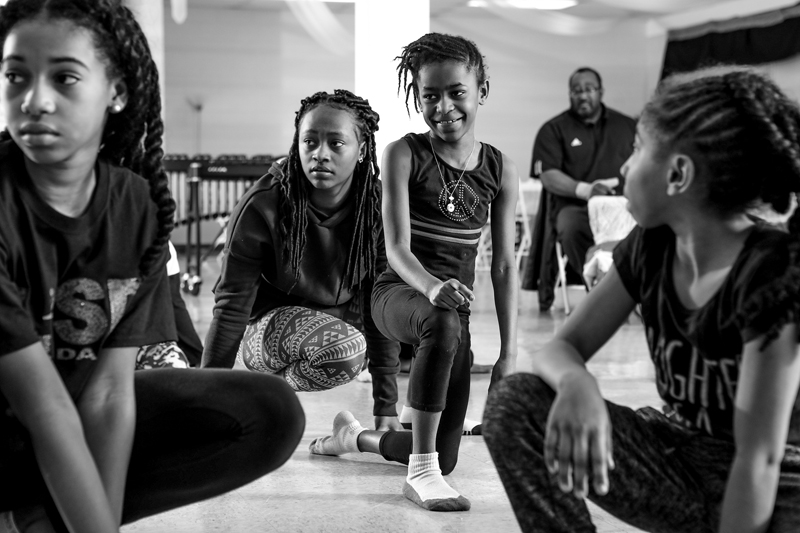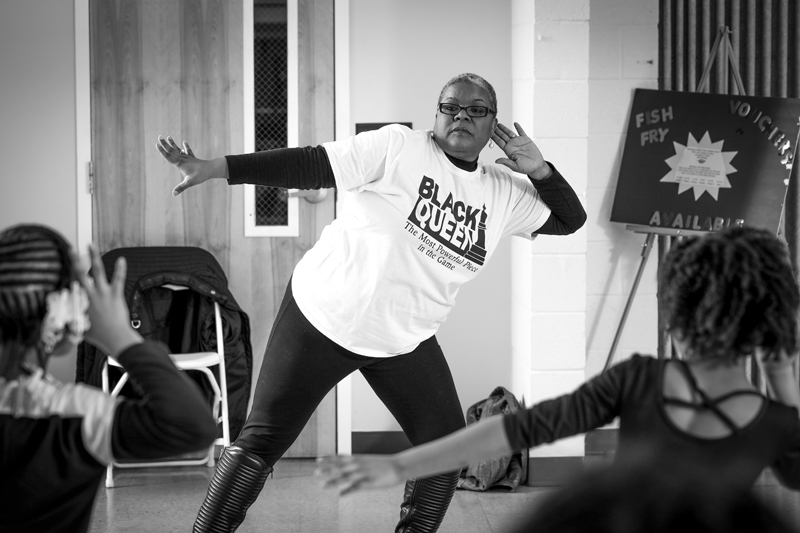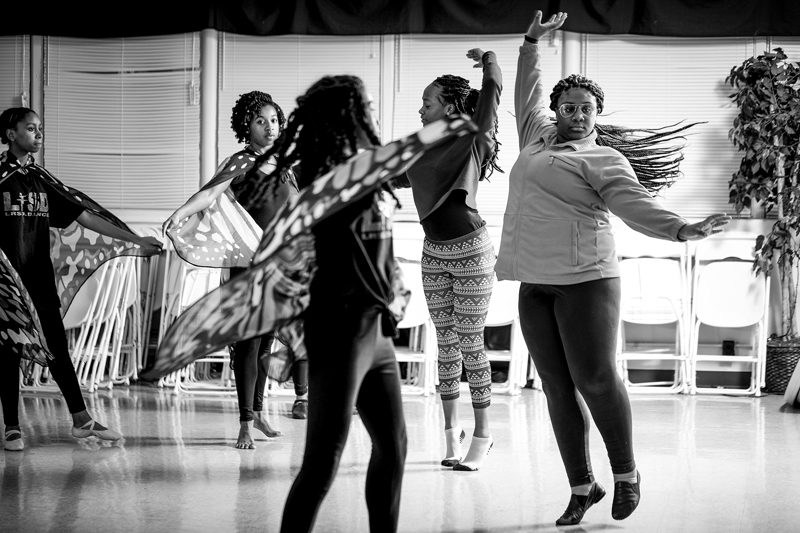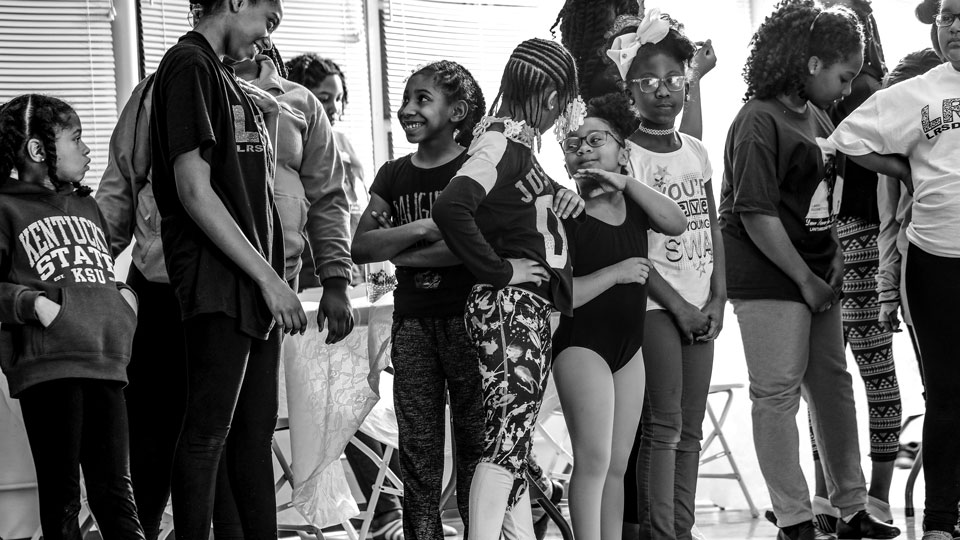Photos by Jessica Ebelhar
Everyone standing in the circle is waiting for Harlina Churn. It’s about 6 p.m., and the students and several teachers from both the River City Drum Corps and the La’Nita Rocknettes School of Dance have gathered at the Immaculate Heart Rectory in Park DuValle to practice for This Is How We Do It: The Musical, a piece about slavery and the Middle Passage they will perform at the Kentucky Center in February. They hold hands, all of them, from the tiniest three-year-olds to the grandmothers here to watch. Everyone, that is, but Rocknettes artistic director Harlina Churn, who has left everybody waiting because someone from the drum corps is missing, and tonight can’t go on unless everyone feels included. Her voice echoes down a hallway, sweet, complex, but firm, like the low register of an alto saxophone. Mothers shift toddlers to their other hips. Toes tap. And then she appears, missing guy in tow, and rejoins the circle. Now the rehearsal can really begin.
“Rub your hands together, get the energy going,” Churn directs, and palms whisper. “We are here because now we’ve been working on our music separately, we’ve been working on our dance separately, and now we want to try to put it together.” She raises her hands high, still rubbing them together, and everyone follows. “That’s that energy, so that when you touch somebody’s hand now, it’s going to be warm. In the African tradition of the ancestors upon whose shoulders we stand, we just say thank you to them. Everybody say, I ni che, with your hands up here,” she says, using the West African Dyula words for thank you. “That’s to thank your ancestors on whose shoulders you stand, because you did not get here by yourself. People died and paved the way for you.”

One of those ancestors was Anita Neil, who founded the La’Nita Rocknettes School of Dance more than 55 years ago in west Louisville. Churn, now 60, started dancing with “Aunt ’Nita” when she was four years old, after her older brother and sister had already joined the school. A lot of students have been dancing with the Rocknettes for a decade or longer, and most have stories like Churn’s: When my sister joined the Rocknettes, When my mother joined, When my grandmother joined.… “See her?” Rocknettes president Owen Neil asks me, pointing out a young girl across the room. “She’s fourth generation. Her great-aunt was in the Rocknettes.”
As the son of the founder of the Rocknettes, Owen Neil was destined to dance. “Man, I was born in the school,” he says. “Before I played sports, I probably had been dancing eight years.” His aptitude for football earned him the nickname “Tank,” to which plenty of the girls here attach Mister.

Katina Whitlock, a former Rocknette who works in public relations at Atria Senior Living, told me her class used to joke that Anita Neil was a drill sergeant. Whitlock and some of her former classmates surprised Neil at the last Christmas show she attended, working up one of their old dance routines. Owen Neil confirms that his mother was tough. “Listen, my mom, she was no-nonsense, no joke,” he says.
Right now, it’s Churn who’s the drill sergeant. The girls have just finished dancing along to the drum corps, whose members have crowded the back of the room with xylophones, what look like marimbas, a keyboard and a drum set. “You don’t do their music justice,” Churn says to the dancers, and faces turn downward. Nile Rowe, a freshman dance major at Manual’s Youth Performing Arts School and a ballet-loving member of the Rocknettes’ Brown Girls En Pointe group, has a solo, and a translucent cape of Monarch butterfly wings billows from her narrow shoulders. Pointe shoes wrap her feet. But some of the other girls have forgotten their equipment. “I’ve only got the one girl en pointe because you forgot your shoes,” Churn scolds. Earlier, when a girl started to explain to Churn why she had missed a move, Churn, who also teaches at Lincoln Elementary Performing Arts School, said, “I do not want to hear excuses. Rocknettes don’t make excuses.”

Discipline and responsibility are a big part of the school. Older girls teach younger girls, lead warm-ups. Churn makes students write about their performing experiences, saying that, as an educator, it’s unacceptable to her if her students can’t express themselves verbally. She even checks their report cards, and takes improving students on fun excursions — they recently went to a bowling alley.
“This has always been about family,” Churn says. “The older kids would get a little sister. And so the big sister took care of the little sister. She’s having problems in school? You tutor. If she was having problems at home, you talk to mom and stuff like that.”

The emphasis on family was part of Anita Neil’s approach. Churn kept a pair of pajamas at her house for when they stayed up too late talking, sewing costumes. Over time, Churn absorbed Neil’s story. Neil grew up in the Beecher Terrace Housing Projects and, Churn says, was the first black person to join the Courtney School of Dance near Fourth and Walnut Street (now Muhammad Ali Boulevard). She would bring her knowledge back to the West End and teach girls out of her mother’s house. As an adult, she bought girls prom dresses. She didn’t care how skinny girls were, and always chose costumes that were flattering to everyone. When Churn was a teenager struggling with self-esteem, Neil entered her in the Park Hill Beauty Pageant without so much as asking. “Why would I go up there and put myself through that torture and agony, knowing that, already, I feel that I’m ugly? You’re talking about a beauty pageant. You’re talking about a girl that, as a teenager, would not go into the bathroom when other girls are in there to try to put on a little lipstick or anything, because I knew they would talk about me,” Churn says. But she put on the Nehru dress printed with a dashiki-like pattern Anita gave her. And she won. “So, to be in pageants, and then to win them? I mean, I ended up going to New York in the Ms. Black America pageant. I started from Park Hill.” Later, she adds, “That’s why I have a master’s degree. My daughter has a master’s degree. All because we went through the La’Nita Rocknettes program.”

Churn was with Neil on her deathbed last year, and she promised her that as long as she drew breath, the Rocknettes would go on. One of Neil’s favorite sayings, “Feel the music and dance,” adorns one wall in the Rocknettes’ main practice space in Christ the King Church on 44th Street. Enrollment is down a little, hovering between 65 and 75 students aged 3 to 18, but Churn is confident it will climb back up. There are about six instructors, and every student gets tap and ballet, with electives available in everything from liturgical to jazz to modern to hip-hop dance. The school is not free, like it was originally, but many families pay adjusted rates.
Back in rehearsal, girls roll toward one another, tumble and cartwheel. Nile Rowe could dance on a music box, her legs so straight, grace hiding her strength. “Do you feel better about that?” Churn asks them, all the harshness drained from her voice. It’s clear from the smiles, and the sweat, that they do.
This originally appeared in the March 2018 issue of Louisville Magazine. Every story in our March issue is about west Louisville, and we’ve barely scratched the surface. Click here to read more from part four of our series on the West End.
To subscribe to Louisville Magazine, click here. To find us on newsstands, click here.



